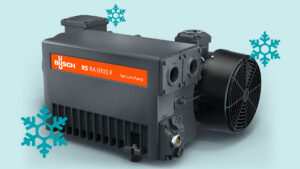Hydraulic Institute Endorses NEMA PREMIUM™
The Board of Directors of the Hydraulic Institute (HI) endorsed the Premium Efficiency Electric Motor program NEMA Premium™. This designation is given to electric motors that meet an industry-defined standard for premium efficiency.
PARSIPPANY, NJ, September 30, 2002 – The Board of Directors of the Hydraulic Institute (HI), the largest association of pump manufacturers in North America, today endorsed the Premium Efficiency Electric Motor program, known and marketed as “NEMA Premium™.” This designation is given to electric motors that meet an industry-defined standard for premium efficiency. NEMA Premium™ was established by the National Electrical Manufacturers Association (NEMA), whose members make over 80 percent of the electric motors sold in the U.S.
“We see significant benefit in the NEMA Premium™ program. It’s a win for industry, energy conservation, and ultimately the consuming public,” said Robert Asdal, executive director of HI. “The concept nicely dovetails with HI’s ongoing efforts to help industry optimize pumping systems design and life cycle cost (LCC) savings. Because pumps are used in virtually every industrial and commercial enterprise, the energy savings potential, particularly in cases where the pump is being run in process type operations, is very significant. This approach also applies to the motors that drive those pumps.”
Asdal points to HI’s latest initiative regarding operational efficiency, a 200-page reference guide, Pump Life Cycle Costs: A Guide to LCC Analysis for Pumping Systems. A joint effort by HI and Europump, the LCC Guide has received high praise for offering proven guidelines that address each interdependent element in a pumping system.
“HI has a long history of promoting energy savings, performance optimization and efficiency. As one of the original signatories to the US Department of Energy (DOE) Motor Challenge Program, we have an excellent working relationship with the DOE. Among other initiatives, a number of HI members have been qualified under the DOE’s Pump System Assessment Tool (PSAT) program to offer systems analysis training to pump users and we offer a video-based educational program on Energy Reduction in Pumps and Pumping Systems,” he continued.
“Collaborating with NEMA gives us the opportunity to jointly address such issues as industrial systems efficiency, energy savings, and total life cycle cost. Combining efforts will strengthen our influence in this area, and help us better define and articulate our role on pump and total systems energy efficiency rather than having one imposed upon us,” Asdal added.
According to NEMA, over 1.2 million integral horsepower electric motors are sold each year. These motors power the U.S. economy via motor-driven systems used in a wide range of industries, including chemicals, mining, forest products, oil and gas, utility, irrigation, general manufacturing, commercial pumps and fans, and compressors. Over 80 percent of industrial, commercial and municipal pumps sold in North America are manufactured by members of HI. DOE research has found that pumping systems account for nearly 20 percent of the world’s electrical energy demand. Based on DOE data, it is estimated that the NEMA Premium™ efficiency motor program could save over 5,800 gigawatt hours of electricity and prevent the release of nearly 80 million metric tons of carbon dioxide into the atmosphere over the next 10 years. That would be the equivalent of keeping 16 million cars off the road.
Last year, the U.S. electric motor industry reached consensus on a specification defining premium efficiency motors and agreed to include the definition in NEMA industry electric motor performance and application standards. NEMA President Malcolm O’Hagan said that “the industry was motivated, in part, by power supply and utility deregulation problems that focused our attention on the need to help industrial motor users and utilities optimize motor systems efficiency. HI’s endorsement of NEMA Premium™ further strengthens the industry’s position.”
NEMA predicts that demand for NEMA Premium™ efficiency motors will exceed demand for the current “energy efficient” products required by the Energy Policy Act of 1992. The Energy Policy Act imposed minimum energy efficiency standards on certain 1- 200 horsepower (HP) general purpose integral horsepower motors. The NEMA Premium™ efficiency motor program covers other types and sizes, including 1-200 HP definite and special purpose motors, motors up to 500 HP, and medium voltage motors. The program is based on products available and sold today and that operate with present day motor support equipment.
About Hydraulic Institute
The 85-year old Hydraulic Institute serves member companies and pump users by providing product standards and forums for the exchange of industry information, including pump standards, life cycle cost guidelines, pump education and other resources. Nearly 100 pump producers and leading suppliers to the industry, are HI members. The organization is headquartered in Parsippany, New Jersey, with full information available at www.pumps.org. A new section of the web site, under “pumps and energy,” addresses the benefits of the NEMA Premium™ program and provides additional links for the benefit of users, specifying organizations and pump manufacturers.
About NEMA
NEMA is the leading trade association in the U.S. representing the interests of electroindustry manufacturers. Founded in 1926 and headquartered near Washington, D.C., its 400 member companies manufacture products used in the generation, transmission and distribution, control, and end-use of electricity. Annual shipments of these products exceed $100 billion.
Source: Hydraulic Institute Inc.







